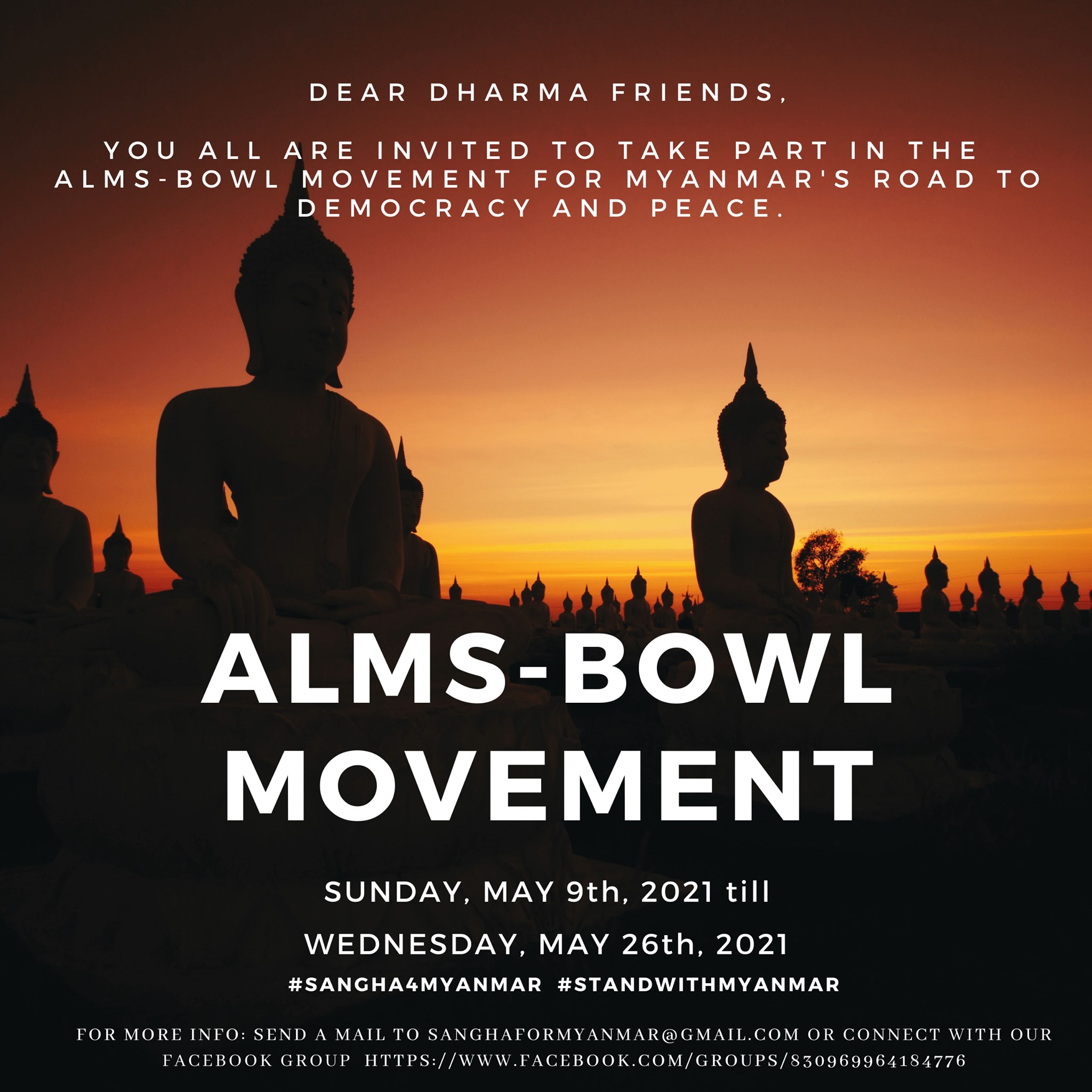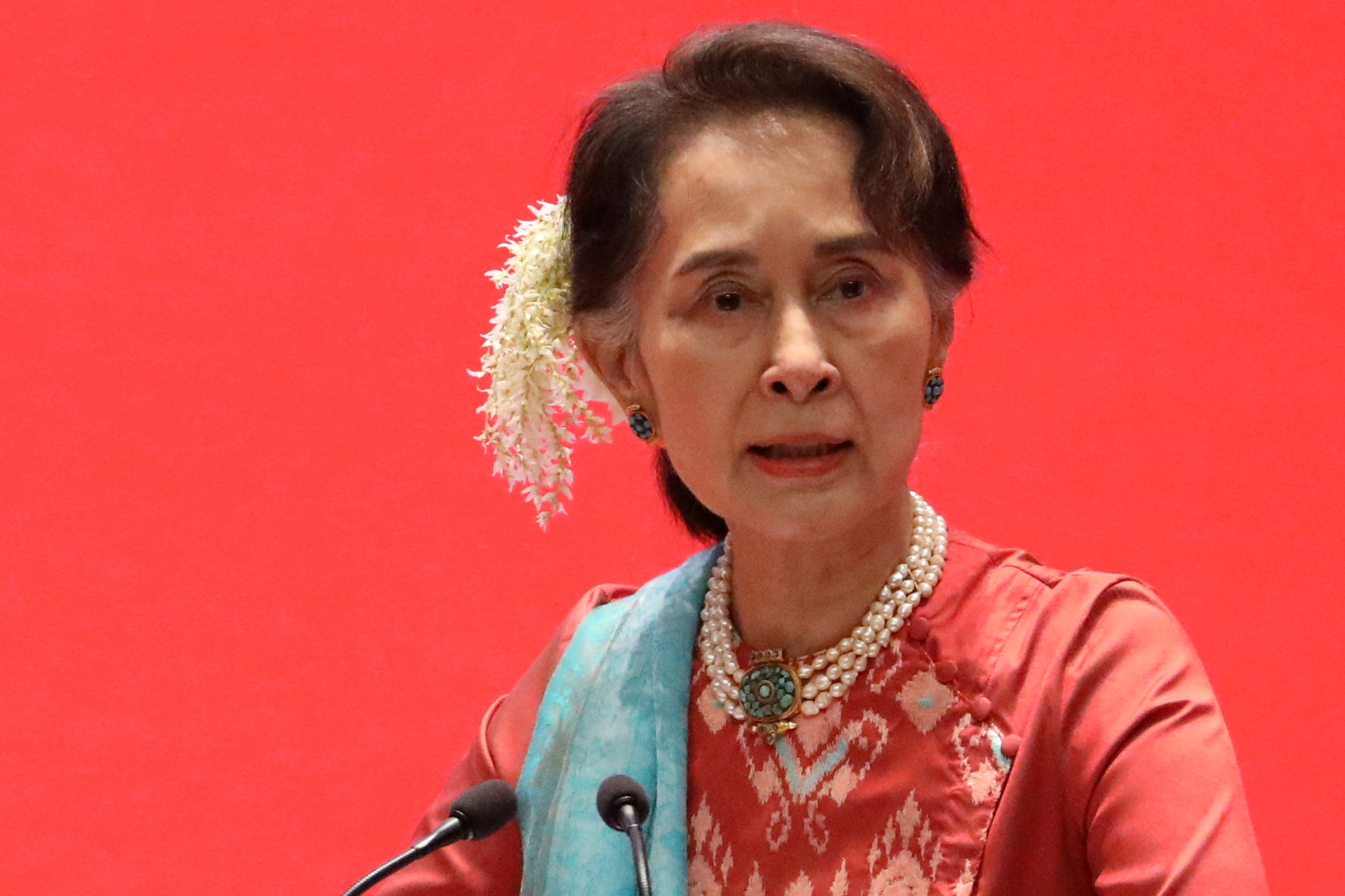Aung San Suu Kyi. From Reuters
Since the generation of Bogyoke Aung San (1915–47), the father of modern Myanmar and father of Aung San Suu Kyi, the nation has been locked in constant political tension over the direction of the country’s governance. On 1 February, the Myanmar military deposed the Burmese government, declaring a year-long state of emergency. Since 12 April, at least 707 civilians, including children, have been killed. The motives remain unclear but with no end to the present crisis in sight, the country looks once more to its spiritual pillar, the monastic community, for general moral guidance in a dark time. At the heart of all the conflict and hatred and confusion, Buddhism speaks with a clear moral voice: no more loss of life. The political situation is no doubt complicated, and Buddhism has always been the first faith tradition to urge empathy for all sides. Yet the egregious loss of life is unacceptable and more should be done to prevent it.
Ven. Vimala, a Dutch-born monastic, has been organizing and taking part in an initiative called Sangha 4 Myanmar, which has been sharing across social media images of monastics overturning their bowl. This highlights to the Burmese military that “harming, abusing and reviling monks and nuns, as well as killing their own citizens, including children, is an act of egregious karma, deeply inhuman and shows that they are not interested in the well-being of the people, nor of practicing and promoting the Buddha’s teachings.” The event has been running since 9 May and will conclude on the 26th.
As Ven. Vimala wrote on her blog about the event: “I emerged to the devastating news about Myanmar, the country that gave me my name and the beautiful and kind people I have encountered there. And the question arises: how is this possible in a Buddhist country? Of course, the answer is, and always will be: avijjā, delusion. I have seen this so often, as we all have, in all societies, all religions, all organizations. We can only try our best to eradicate it in ourselves and make it our lifelong goal to do so. Without meditation, the deeper insights into our own being and the processes that form us, it is impossible to really change. But the only thing we can do is to try. To try to become progressively less deluded, to live every day as if it is a brand-new beginning and to try our best to be loving and kind, learning along the way.
“So, we have to forgive ourselves, and others, for our mistakes. But how hard is this to do when you are faced with such violence and anger? Just know that underneath all harsh words or acts of violence there is a deep-seated and blinding fear. Knowing that we can find some compassion in our hearts, also to those who hurt us. We have to do what we can to stop the violence, but in our hearts, we should have only compassion otherwise we become what we fear. In the end only true compassion can overcome fear and this is the practice I have dedicated my life to.”
Who better to speak about the ongoing crisis than a Burmese monk, Ashin Htavara, who has provided us with precious, Dharma-based insights into the crisis. Our conversation is below:

Buddhistdoor Global (BDG): Buddhism teaches cause and effect, and that at the root of every great conflict is an ignorance and the three poisons. Myanmar is currently in a state of great civil conflict. How can the nation find a way out of its current morass of deep-rooted problems?
Ashin Htavara (AV): Buddhism urges peace of inner mind, forgiveness, and love for our environment. The Buddha himself came to the battlefield to rebuke his relatives. We must dothe same. The Buddha taught non-violence; he did not just preach peace when it was easy. He was also a religious leader who personally raised the issue of preventing war. He himself went to the Thek and Kolayas, who were struggling to make war on the Rohingya River because of water scarcity, and put out the flames of war. He also persuaded King Azatasattva to fight the Vajrayana.
See what the Lord says in the Sakkavatti Sutta: “People will behave well when their ministries act good and fair enough to their civilian follow by the leaders of country.” When you wrap a fragrant flower in a wrapper, it is as if the fragrant wrapper is fading. Theft; lying; violence; hate; and poverty often results from immoral crimes. The government rewards and commits these crimes. The Buddha said that it is futile to eradicate crime by force, even if it is possible to punish and suppress it. (Sakkavatti Sutta, Parthika Vagga)
That is why everyone must abide by the law. Everyone who lives in a society is subject to the rules and regulations of the society in which they live. The political system in which we live is governed by the will of the people, and there is an urgent need for peace and the international community to intervene in the peace process.
BDG: Monks have traditionally taken various sides throughout tumultuous periods in Myanmar’s history. What is the right way to come to a perspective while remaining unattached as well as minimizing our natural human bias?
AV: In Buddhism, the Sangha is not often involved in secular affairs, but the Sangha, a powerful force in Myanmar’s various political and social spheres, is a powerful organization. Historically, monks have been involved in politics whenever they felt it was time to preserve the country’s Buddhist identity.
In Burma, Buddhism and nationalism have long been intertwined. The Sangha has a considerable influence on Buddhist Burmese society. The monks’ significant entry into the secular society of the people dates back to the 19th century when the British occupied Myanmar.
As long as fear, hatred and discrimination cover the skin of nationalism, doubts remain about the potential for peace and prosperity in a multicultural Myanmar. Both the people of Myanmar and the monastic community need to question themselves about the national identity they aspire to. In a country as culturally rich as Myanmar, it would not be possible for a peaceful and democratic nation to build a national identity based on a single nation with a large population and a single religion. In the future, Myanmar’s image needs to be something that can cover the country’s unique ethnic and cultural features. For this to happen, an important part of Buddhism, which dominates many aspects of Burmese culture, must not be overlooked.
BDG: Conflict can be exacerbated when one side shows no willingness at all to compromise. At this point, how can polarized groups muster the spiritual courage and political pragmatism to come to a settlement when either side sees the other as something that must be completely suppressed or destroyed?
AV: The most difficult problems are the lack of trust between the central government, which includes the majority of Burmese, and ethnic minorities. In the face of such mistrust and hostility, it would not be realistic to expect the two leaders to make concessions for a peace deal. Negotiations are being conducted by the top leaders in a top-down manner. Ordinary people on both sides are not allowed to participate. There are no economic or political incentives for ordinary people to strengthen the peace process.
China is changing its strategy to resolve the conflict in Burma and is testing a completely different approach. This approach is immersed in the idea that economic growth can have a short-term and lasting effect, and that economic integration will create long-term benefits for reconciliation.
Compared to top-down-top-level peace talks, the current development-oriented approach is people-centered, aiming for a real bottom-up approach to real-world reconciliation. The change represents a reflection of China’s new strategic strategy and reflects the consensus of various Chinese agencies.
No one knows if this approach will succeed. In the Burmese case, we have ended up in civil tensions that was successfully resolved through the economic development and integration of various communities. Promoting economic development poses a danger to ethnic armed groups, as well as deepening hostility between ethnic areas and the rest.
In China’s own case, economic integration between the mainland and Taiwan has not yet achieved the political reconciliation that Beijing has longed for. In minority areas such as Xinjiang and Tibet, there is a record of economic development, but no peace and stability.
The long-term approach to stability through economic development is not the worst idea, as other political and military options have not been successful. And of course, anyone interested in the future of Myanmar should pay attention.
BDG: In Buddhism we are taught not to think in terms of heroes and villains or moral dichotomies. How should we think of seemingly intractable conflicts like what we see in Myanmar today?
AV: The Buddha taught that the three basic truths of the universe (the three characteristics) are that everything is always changing (anicca); nothing has a lasting essence (anatta) and nothing is completely satisfied and unsatisfying (dukkha). The people of our world must work to prevent violence. The situation in Burma is already at the point of civil war. We call on the world to recognize our National Unity Government, support and consider to the people of Burma. We hope the world can help the people of Myanmar as their part of family. Help the people of Myanmar with all your concern and love.



[…] https://teahouse.buddhistdoor.net/overturned-alms-bowl-the-buddhist-take-on-the-myanmar-crisis/ […]
[…] schliessen uns der weltweiten Sangha an ~ http://www.SVB.org. Umgekehrte Almosenschalen: Die buddhistische Heransgehensweise zur Myanmar […]